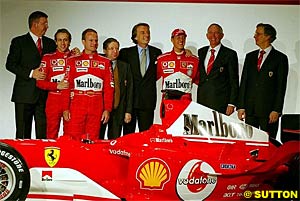
Atlas F1 Senior Writer
After four seasons of domination, Ferrari and Michael Schumacher face what could become the year of their dethroning. Atlas F1's Roger Horton looks at the prospects of the season ahead and analyses the possible changes in F1
"When you are behind you tend to work harder to catch up, and when you are ahead you tend to - not relax - but you tend to consolidate a bit, and so it tends to self-level when you have got two or three very strong teams trying to beat each other. The team in front want to maintain their reliability, they are more reluctant to try new things," said Brawn at the time.
Since Ross Brawn spoke those words Ferrari have won 35 races. Williams have won nine and long-time archrivals McLaren just seven. Somewhere along the line Brawn's theory went out the window as Ferrari found ways to make their car faster without losing any reliability. Sure, they have shown chinks of vulnerability on a few occasions, but they have always managed to outwit and outsmart their opposition when it mattered. Ferrari in recent years have surely been the ultimate survivor.
Last season, though, there were clear signs that Michelin were at last consistently producing a superior dry weather tyre and the Bridgestone shod Ferraris were powerless to respond. At the Hungaroring, Ferrari were humiliated and their response led to the infamous Michelin 'front wide tread' controversy. Michelin were wrong footed successfully once but they are unlikely to be caught out twice, and from all reports of pre-season testing, the Michelin shod cars have an air of confidence that is more than normal pre-season hype.
If Michelin do indeed provide their teams an edge, this could finally lead to the catch-up philosophy that Brawn spoke about some fours years and as many Championships ago. A Ferrari team under pressure is just as venerable as any other team, it's just that their successes in recent years have provided insulation against the kind of criticism that affects any outfit.
And what of their six time Champion Michael Schumacher? Reports in the off season in some sections of the Formula One media have had the German retiring well before the expiration of his current contract in the face of this expected Michelin led onslaught. Certainly Schumacher was far from his best last season, making driving errors in the first three races and then securing his sixth Championship at the last race of the year in Japan despite driving perhaps the worst race of his F1 career.
But what so many miss is just how much Schumacher enjoys being an F1 driver. During most of an F1 weekend he has his game face firmly in place as he does his job and deals with all the pressures, outwardly unmoved by all the attention and adulation he receives.
Out on the track Schumacher is in another world and it's his world, the only one he has ever known. Driving racing cars is, after all, the activity that has consumed his whole life and sometimes you see flashes of his thoughtfulness and brilliance that linger long in the memory.
Flashback: an unimportant Friday practice session at Silverstone in 2001. The McLarens of Mika Hakkinen and David Coulthard are on top of the timing sheets as Schumacher's Ferrari rolls down the pit road with just moments of the session remaining. Before the Ferrari can get up to speed, a steady drizzle starts to fall.
As the cars with dry weather tyres tip toe slowly back to their pits on a wet track, Schumacher's Ferrari could be seen power-sliding around Silverstone's bleak extremities in a series of glorious power slides that served no purpose other than to fuel the juices of the driver inside the cockpit.
Michael Schumacher drives this way because he can. He could have just cruised back to his pits like everyone else and parked it. But he was driving on a slippery race track with 800 hundred horsepower under his right foot and his instincts and the pure joy of driving such a responsive car took over. Perhaps he learnt something about his set up as well but that was hardly the purpose.
Schumacher, one suspects, will continue racing whilst he still enjoys it. But will that enjoyment survive being outperformed on a regular basis as he was last season by his hitherto long suffering teammate Rubens Barrichello? If it were not for the numbers on the cars and the helmets of the drivers it would have been hard at times to distinguish between the six times Champion and his Brazilian teammate as the two Ferraris powered around the tracks.
If Barrichello continues where he left off last season then the bruising Michael's ego might take will almost certainly override the enjoyment he derives from racing every second weekend throughout the summer. Ayrton Senna once famously stated that he wasn't built for coming second, and one can safely assume that Michael Schumacher isn't either. That's the way of Champions, and the German is certainly that.
Logically only two teams - Williams and McLaren - have a serious chance of dethroning Ferrari, if indeed they are to be dethroned at all. As I have 'Gambled' elsewhere in this issue, my money is on Williams. They could and should have won the Constructors' Championship title in 2003 and one of their drivers could have been crowned as Champion if they had raced to their collective potential throughout last season.
McLaren are coming off a season in which, incredibly, they failed to actually launch a totally new car, a huge embarrassment for a team of their experience and stature. Not withstanding the impressive job they did in almost rescuing their season and taking their Championship challenge down to the wire with the MP4-17D, they may yet find besting the new Williams a step too far.
The new season sees, of course, the introduction of the new 'One Engine Rule', a process of cost reductions that started some two years ago when the F1 press corps assembled in Australia with dire words of warning concerning escalating costs threatening the very future of the sport from FIA boss Max Mosley ringing in our ears. The FIA got what it wanted (or what it could get agreed with the teams?) and now we have the teams limited to just one engine per car per race weekend.
Cost problems sorted? Apparently not, if F1 supremo Bernie Ecclestone is to be believed. As the teams prepare to pack their bags for Australia they are again being warned by Ecclestone, in an almost identical form of words, that costs must be reduced dramatically for Formula One to just survive!
Nothing, it seems, ever really changes in the hectic world of hi-tech Formula One. Not the politics, not the glamour, not the constantly upward movement of budgets, nor the intensity with which the teams compete, and for the last four years, the names on the trophies at year's end.
Perhaps, to the relief of at least one other team in the pitlane and many others in the sport, that just might change this season. Surely not everything in Formula One this season is destined to remain the same? And could this be the year when Brawn's prediction finally comes true?
Is this the season when Ferrari are finally knocked from their perch as F1's dominant team? Will they, in the words of their technical director Ross Brawn, finally 'self level' against their competition after four straight years of almost unbroken dominance that has dented the reputation of their rivals and re-written the record books?
 It was just prior to the United States Grand Prix in Indianapolis, back in 2000, that Ross Brawn, then locked in a seesawing battle of for supremacy with McLaren, talked about the inevitability of having their technical advantage eroded by a combination of his own innate desire to protect his advantage by being conservative with developments, and the oppositions' counter tendency to risk all in an effort to be competitive.
It was just prior to the United States Grand Prix in Indianapolis, back in 2000, that Ross Brawn, then locked in a seesawing battle of for supremacy with McLaren, talked about the inevitability of having their technical advantage eroded by a combination of his own innate desire to protect his advantage by being conservative with developments, and the oppositions' counter tendency to risk all in an effort to be competitive.
|
Contact the Author Contact the Editor |
Please Contact Us for permission to republish this or any other material from Atlas F1.
|
Volume 10, Issue 8
2004 Season Preview
The Atlas F1 2004 Gamble
The 2004 Drivers Preview
The 2004 Teams Preview
The 2004 Technical Preview
The Formula One Insider
The Time to Self Level
The New Deal
2004 Countdown Facts & Stats
Columns
On the Road
Elsewhere in Racing
The Weekly Grapevine
> Homepage |
